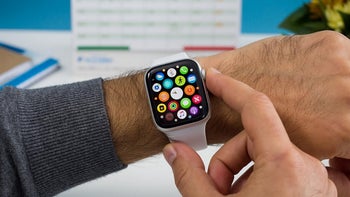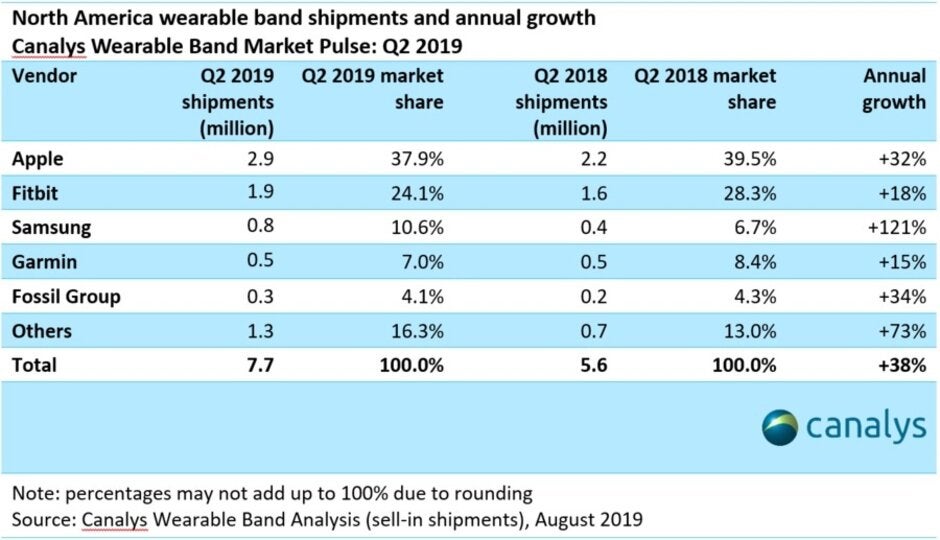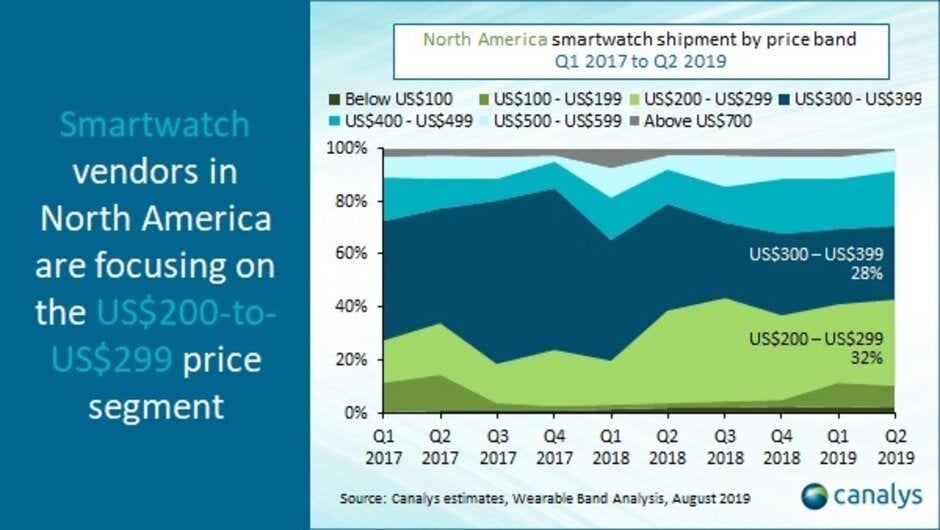Apple Watch remains the top device in the North American wearable band market

Canalys released today its latest read on the North American wearable band market. During the second quarter of this year (April through June), a total of 7.7 million units were delivered in the continent, up a strong 38% from the 5.6 million units shipped last year. The data shows the Apple Watch with a commanding 37.9% share of the market during the quarter. Apple shipped 2.9 million smartwatches over the three months compared to the 2.2 million it delivered during the same period last year for an improvement of 32%. Despite the increase in shipments, Apple's market share actually declined from the 39.5% share it had during last year's second quarter.
Samsung had the best annual gain as its shipments soared 121% from 400,000 in Q2 2018 to 800,000 this year. That gave it 10.6% of the North American wearable band market during the period, good enough for third place after Apple and Fitbit. The latter shipped 1.9 million units in the continent from April through June, one million units behind Apple. Fitbit had a 24.1% slice of the NA wearable band market in the quarter following an 18% improvement in shipments year-over-year. Garmin took fourth place with a share of 7% with Fossil rounding out the top five with a 4.1% share.
Cellular connectivity and health-related features are driving the market
Canalys notes that Samsung's huge annual gain was led by strong demand for its fitness-focused Galaxy Watch Active series, priced in the sweet spot between $200-$300. The research firm notes that the $200 to $299 price segment is the area being targeted in North America by smartwatch manufacturers. 32% of the wearable band devices shipped in the continent during the second quarter were in that price range, while 28% of the units shipped carried a price tag in the range of $300-$399.

The Apple Watch had a commanding share of the North American wearable band market during the second quarter
So what is driving the smartwatch market in North America? According to Canalys that would be cellular connectivity and certain health features. But the research firm says that the Apple Watch will be hard to beat with its combination of LTE connectivity and collection of health-related data.
"Smartwatch vendors are increasingly getting nearer the bullseye-hitting the right price point in a way that spurs massive demand. With Samsung's new Galaxy Watch branding in place, and showing robust performance, the company has moved to cultivate a fitness-focused lineup with the Galaxy Watch Active series, with prices between $200 and $300. Packing features into a compact form factor that has an appealing design is challenging but rewarding. Samsung most recently showcased these capabilities with its Galaxy Watch Active 2 series, though other vendors are close behind. There is certainly demand for affordable smartwatches with strong health and other intelligent features, but Fitbit's misstep with the Versa Lite shows that consumers will shun overly pared-down smartwatches if they are not appropriately targeted, and especially when its obvious they are losing functionality."-Vincent Thielke, analyst, Canalys
The Apple Watch Series 4 has a pair of breakout new features that are being copied by Samsung on the Galaxy Watch Active 2. One is the electrocardiogram (ECG) monitor that looks for abnormal heartbeats, a sign of Atrial fibrillation (Afib). The latter can cause strokes, heart disease, blood clots, and death. The second feature is fall detection, which can detect when the person wearing the watch falls. If that occurs, the watch will sound an alarm and give the user an opportunity to call for help. If the watch senses that the user is not moving, it will automatically call 9-1-1 and send text messages to the person's emergency contacts list with the location of the user.

The $200-$299 segment is the most popular among vendors in North America










Things that are NOT allowed: